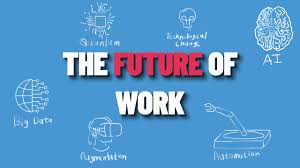The future of work is undergoing significant transformation driven by technological advancements, demographic shifts, and evolving workplace dynamics. From remote work and automation to skills development and organizational agility, the workplace of tomorrow is shaping up to be vastly different from today. This article explores key trends, challenges, opportunities, and implications for the future of work.
Key Trends Shaping the Future of Work
- Remote Work and Digital Nomadism: The widespread adoption of remote work, accelerated by the COVID-19 pandemic, has reshaped traditional office dynamics. Employees and employers alike are embracing flexible work arrangements, digital collaboration tools, and remote productivity solutions.
- Automation and AI: Automation technologies, powered by artificial intelligence and robotics, are transforming industries by automating routine tasks, enhancing operational efficiency, and augmenting human capabilities in complex decision-making processes.
- Skill Shifts and Lifelong Learning: The rapid pace of technological change requires continuous upskilling and reskilling of the workforce. Skills in data analytics, AI, cybersecurity, and digital literacy are becoming increasingly crucial for career advancement and job retention.
Challenges in the Future of Work
- Job Displacement and Reskilling: Automation and AI may displace certain roles while creating demand for new skills. Bridging the skills gap through reskilling programs and lifelong learning initiatives is essential to mitigate unemployment and promote workforce adaptability.
- Workplace Diversity and Inclusion: Promoting diversity, equity, and inclusion (DEI) in the workplace remains a challenge. Addressing biases in hiring practices, fostering inclusive cultures, and promoting diverse leadership are critical for creating equitable opportunities in the future workforce.
- Digital Divide and Access to Technology: Ensuring equitable access to technology and digital skills training is essential to prevent widening disparities between digitally literate and marginalized populations. Closing the digital divide is crucial for inclusive economic participation.
Opportunities and Innovations in the Future of Work
- Flexible Work Models: Continued adoption of hybrid work models, combining remote and in-office work, offers flexibility for employees while enhancing productivity and work-life balance.
- Gig Economy and Freelancing: The rise of the gig economy provides opportunities for freelancers and independent contractors to contribute specialized skills on-demand, offering flexibility and entrepreneurial opportunities.
- Human-Centered Design: Designing workplaces and technologies with a focus on human-centered principles, including employee well-being, mental health support, and work-life integration, fosters a positive and productive work environment.
Implications for Organizations and Leaders
- Agility and Adaptability: Organizations must cultivate agility to respond to rapid changes in technology, market demands, and workforce expectations. Agile frameworks enable quick decision-making, innovation, and responsiveness to disruptions.
- Leadership and Employee Engagement: Effective leadership is crucial in navigating change, fostering employee engagement, and promoting a culture of continuous learning and innovation. Leaders who prioritize empathy, transparency, and inclusivity can inspire trust and resilience in their teams.
- Ethical Considerations: Ethical dilemmas surrounding AI, automation, data privacy, and workplace surveillance require thoughtful consideration and robust governance frameworks to ensure fairness, transparency, and respect for employee rights.
Future Directions for the Future of Work
- Workforce Automation: Expanding automation beyond routine tasks to knowledge work and decision support systems, while creating opportunities for human-AI collaboration and creativity.
- Workplace Innovation: Embracing smart workplace technologies, augmented reality (AR), virtual reality (VR), and Internet of Things (IoT) applications to enhance collaboration, productivity, and employee experience in hybrid work environments.
- Policy and Regulation: Developing policies and regulatory frameworks that support digital transformation, protect worker rights, and ensure ethical AI deployment while fostering innovation and economic growth.
Conclusion
The future of work is characterized by rapid technological advancement, shifting workforce demographics, and evolving organizational practices. Embracing flexibility, agility, lifelong learning, and ethical considerations will be crucial for organizations and leaders navigating these changes. By embracing innovation, fostering inclusive workplaces, and prioritizing human-centered design, stakeholders can harness the opportunities of the future of work to create resilient, sustainable, and equitable workplaces for all.
